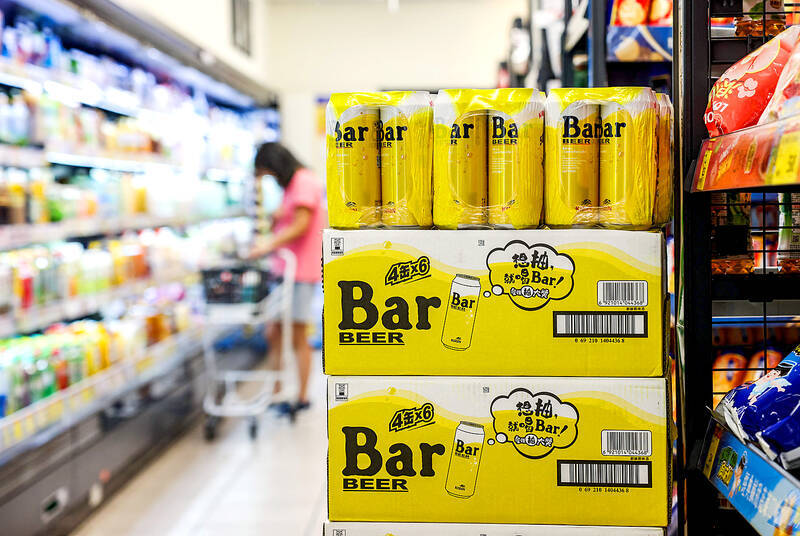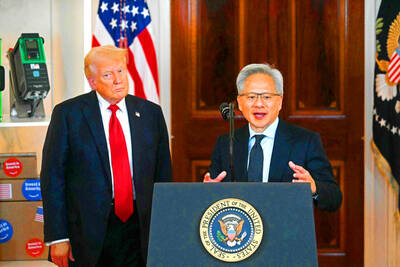The Customs Administration on Wednesday confirmed that beer and certain hot-rolled flat steel products imported from China would continue to be subject to anti-dumping duties, adjusting the rates for specified companies starting the same day.
The agency said imports of beer from Chinese companies would face duties of 19.13 percent to 51.94 percent and designated hot-rolled flat steel products from 16.10 percent to 20.15 percent.
Provisional duties have been in place since June, but the agency’s announcement — following the conclusion of its investigation into the unfair trading practice — confirms the factual basis of Chinese dumping in these product categories.

Photo: AFP
According to the Customs Administration, the anti-dumping duties targeting several Budweiser-affiliated breweries are set at 31.3 percent, down 2.55 percentage points from the provisional rate in June.
A Chinese brewery producing Kirin beer products was assigned a final dumping duty of 19.13 percent, an increase of 6 percentage points, while other beer manufacturers or exporters were given 51.94 percent, down 12.2 percentage points.
For designated hot-rolled flat steel products, three Chinese iron and steel companies received an anti-dumping duty of 16.1 percent, a decrease of 0.8 percentage points, and other manufacturers or exporters remained at 20.15 percent, the agency said.
Customs Administration officials explained that they conducted on-site inspections during the investigation and accepted certain cost items not recognized earlier, while adjusting mismatched data. These changes led to the adjustments announced on Wednesday.
The agency added that it had notified the Ministry of Economic Affairs of its investigation results, with the ministry required to complete the final investigation on whether the dumping harms Taiwan’s industry and to evaluate its impact on the national economy within 40 days.
Meanwhile, the Taiwan Brewers Association said the anti- dumping duties would help ease the short-term impact on Taiwan’s beer industry.
The association said that Taiwanese brewers would not compromise with low-price dumping that violates WTO rules, adding that some importers ignored the investigation rules and imported large amounts before the provisional duties took effect, with imports of Chinese beer increasing 59 percent in May and soaring 110 percent in June compared with a year earlier.
According to the association, Chinese beer accounted for more than 70 percent of beer imports to Taiwan and more than 39 percent of Taiwan’s overall beer market in the first half of the year, severely impacting domestic and other imported beer markets.
The association said that Chinese beer makers have long received subsidies from the Chinese government and that suppliers of key raw materials such as malt, aluminum cans and glass bottles are also backed by state-owned enterprises or heavy subsidies, distorting market mechanisms.
It also said China continues to ban imports of Taiwan Beer and Taihu Beer, and that Chinese brewers often package products under international brands or use Taiwanese local elements to confuse consumers about product origins.

Taiwan Semiconductor Manufacturing Co (TSMC, 台積電) last week recorded an increase in the number of shareholders to the highest in almost eight months, despite its share price falling 3.38 percent from the previous week, Taiwan Stock Exchange data released on Saturday showed. As of Friday, TSMC had 1.88 million shareholders, the most since the week of April 25 and an increase of 31,870 from the previous week, the data showed. The number of shareholders jumped despite a drop of NT$50 (US$1.59), or 3.38 percent, in TSMC’s share price from a week earlier to NT$1,430, as investors took profits from their earlier gains

AI TALENT: No financial details were released about the deal, in which top Groq executives, including its CEO, would join Nvidia to help advance the technology Nvidia Corp has agreed to a licensing deal with artificial intelligence (AI) start-up Groq, furthering its investments in companies connected to the AI boom and gaining the right to add a new type of technology to its products. The world’s largest publicly traded company has paid for the right to use Groq’s technology and is to integrate its chip design into future products. Some of the start-up’s executives are leaving to join Nvidia to help with that effort, the companies said. Groq would continue as an independent company with a new chief executive, it said on Wednesday in a post on its Web

CHINA RIVAL: The chips are positioned to compete with Nvidia’s Hopper and Blackwell products and would enable clusters connecting more than 100,000 chips Moore Threads Technology Co (摩爾線程) introduced a new generation of chips aimed at reducing artificial intelligence (AI) developers’ dependence on Nvidia Corp’s hardware, just weeks after pulling off one of the most successful Chinese initial public offerings (IPOs) in years. “These products will significantly enhance world-class computing speed and capabilities that all developers aspire to,” Moore Threads CEO Zhang Jianzhong (張建中), a former Nvidia executive, said on Saturday at a company event in Beijing. “We hope they can meet the needs of more developers in China so that you no longer need to wait for advanced foreign products.” Chinese chipmakers are in

POLICY REVERSAL: The decision to allow sales of Nvidia’s H200 chips to China came after years of tightening controls and has drawn objections among some Republicans US House Republicans are calling for arms-sale-style congressional oversight of artificial intelligence (AI) chip exports as US President Donald Trump’s administration moves to approve licenses for Nvidia Corp to ship its H200 processor to China. US Representative Brian Mast, the Republican chairman of the US House Committee on Foreign Affairs, which oversees export controls, on Friday introduced a bill dubbed the AI Overwatch Act that would require the US Congress to be notified of AI chips sales to adversaries. Any processors equal to or higher in capabilities than Nvidia’s H20 would be subject to oversight, the draft bill says. Lawmakers would have